Ecocil: Real Estate and Property Market in Rio Grande do Norte
Silvio Bezerra, President and CEO of Ecocil
Silvio Bezerra introduces the property market in Rio Grande do Norte and presents his company, Ecocil. He mentions some of its projects and discusses the company’s main differentials. He also talks about international partnerships and shares his vision for the future.
Interview with Silvio Bezerra, President and CEO of Ecocil
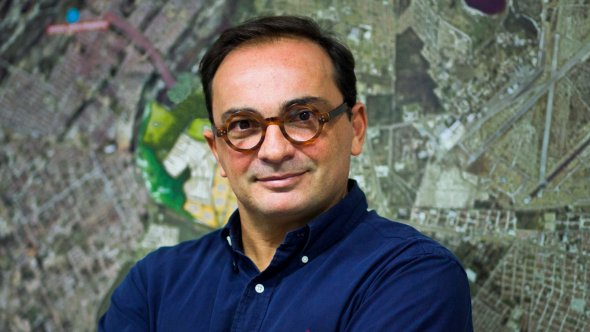
I would like to begin this interview with an introduction to the property market in Rio Grande do Norte.
We are creating a new neighbourhood that is going to be called Bouganville. It is going to be an area of 240 hectares in the heart of Natal, in the last available area between the airport and the city. We are going to build a planned neighbourhood; a community for which we are contracting the best professionals available in the world.
The property market in Rio Grande do Norte is experiencing growth at the moment. In the last 10 years the market has grown from having revenues of 200 million to 2 billion reals a year. Various companies from the south of Brazil arrived to compete in the property market with the local companies. However, the majority of local companies continue and will continue to be strong and successful. To use Ecocil as an example, Ecocil is a local company that created a partnership with an English investment fund to be able to continue in its position as the leader in the market. A while ago Rio Grande do Norte began producing units to sell to foreign markets, this section has been moving a little slowly due to the economic crisis in Europe, but those companies who focused their objectives and products on the domestic market have had no problems, actually on the contrary they have been seeing excellent returns and good growth.
Can you give us a few key pieces of information about Ecocil?
Our company was founded in 1948; we are the third generation of the company. Up until 2008 this was a completely family run business, a limited company in construction and real estate development. In 2008 there was the phenomenon here in Brazil whereby various companies from the south expanded all over the country as a consequence of their IPOs and the extra capital they had made on the stock market. These companies from the south began to look for new markets to expand their companies and Natal and Rio Grande do Norte were places that these companies came to. We had to do something to be able to keep our hold on the market or else we would have been left as a very small company in comparison.
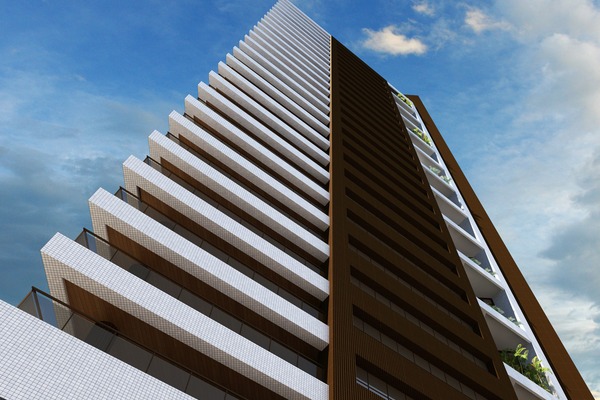
We had to launch 2 or 3 business ventures to compete with the largest property companies from São Paulo. At the time, we didn’t have many alternatives, because the Bovespa (São Paulo’s stock exchange) didn’t view our company as one to generate capital in the same way as the other property companies because we were restricted to the market in Rio Grande do Norte. At that time, this was not a good thing; today on the contrary the regional market is very strong. Therefore we had to look for a financial and commercial partner outside of Brazil. I had the opportunity to attend various international trade fairs in 2006, 2007 and 2008. I went to the real estate fair “Salão Imobiliario” in Lisbon, the “Salon Imobiliario” in Madrid, the “Barcelona Meeting Point”, and “A Place in the Sun” fair in London. We went to the main property fairs in Europe, because at that time here in the north east, we were experiencing the phenomenon of companies coming to the north east of Brazil, fleeing the crisis in Europe and looking to buy plots here to develop projects. These same companies were looking to work with local constructors. So in 2006 we founded an association called Adit (Association for property and tourism development), between myself as the representative for Rio Grande do Norte, Felipe Cavalcante who represented Alagoas and Maceió, and further representatives for each of the other states. At that time I was president of Sinduscon which was the union representing civil construction in Rio Grande do Norte. I was a representative in this association and so this allowed me to go to all these fairs during those years. This is how I came into contact with Salamanca Capital, who was coming to Brazil to invest money in the property market, because they have experience in investing in emerging markets. Rio Grande do Norte was their target to begin their operations in South America.
Why did they choose Rio Grande do Norte? Well, because Salamanca was looking for a state that was experiencing better growth than the average growth in Brazil which was the case in the north east of Brazil. They were looking for a state that was not too big to require a huge investment and they were looking for a serious company to work with. They came here and met us, and according to them the main factor that made them decide on us was that they thought our management team and the people that made up our company i.e. our family had the perfect profile.
On the 22nd December 2008, in the middle of the economic crises which blew up in America in September 2008 we signed the contract, they bought 50% of our company. Three years later in February last year, we received further capital from them and so in those three years the company has grown by 300%, which brings great satisfaction to them and to us. So the proposal that was made to find the space for them to grow and for us to have the support of their capital was a success. Today the great advantage of having a partnership with a company like Salamanca is that they don’t only add value to our company in terms of capital but also in their know how in the property market. Salamanca has previously been working in emerging markets for example Russia, Turkey and Eastern Europe and so they are able to predict situations in the economy that happen or that could happen. They have experience having worked in those countries with economies that have developed in a similar way to the economy here in Brazil, therefore they are equipped to anticipate situations and they are better prepared to take on these difficult situations. It was a really good partnership venture, and it still is really good. Initially the idea was for them to separate from the company in 3 to 5 years but this has been extended to 5 more years, and there are rumours and we are in talks regarding their interest in buying more shares for this successful partnership to continue into the future.
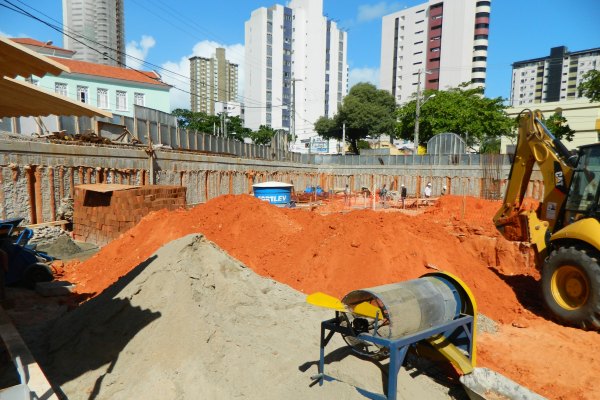
I would like to talk about the strengths of Ecocil compared to its competition and a bit about its ventures.
There are many things that set us apart from our competitors but the main thing is the brand. In 2008 we split our company and founded this new company with the support of Salamanca. The company which was 58 years old received the capital support; it had been a limited company of construction and real estate development in the same legal entity. We divided the company in two, one which took on the technical engineering side, with the tried and tested technicians and engineers, and the other company inherited the brand name. The concept of the brand is really important in the property market, to have credibility in this sector. This company also inherited all of the files of projects and land plots that belonged to the family company. We created two companies; the company that inherited the technical roles is called Ecocil Engineering and it is solely a construction company without the rights to operate as property developers. The other company of which I am President, is a property developer, we divided the companies in this way so as to not compete with each other. Therefore any project development goes on in this company in which the English investment fund is a partner. If we were to build a development project then we would have to use the other engineering company in which only my relatives and my parents are partners. Therefore each company has its interests well focused.
The main thing that sets us apart from our competitors is the credibility of our brand. However this credibility is not merely acquired through publicity or long term campaigns with our name. When people sell an apartment with us they are selling much more than just an apartment. Over the 25 years that I have been at the head of my family’s company, I can remember how the company was in those days and how it is now. When I qualified in 1993 one of my projects was to develop a factory, I remember that at that time we didn’t talk about ISO 9000 or quality control programs or anything like that. In Brazil at that time there was so much waste in construction works. The civil construction industry was a disaster in terms of waste. You could easily say that of all the material that arrived only 30% went into the final product. We are talking huge amounts of waste. The thing that shocked me the most was the way that co-workers were treated. In terms of their lunch break for example the workers ate in their hard-hats, they didn’t have tables to eat their lunch at. It was a factory on the outskirts of Natal, the area was huge, 60,000m2, it used to be a coconut field, and yet the factory didn’t have anywhere for the workers to eat their lunch. I arrived on my first day in this coconut field and saw that at the bottom of each coconut tree there was a small fire on the floor with a pan cooking away with some beans. I was told that each worker brings their pan to make their own food and leaves it cooking away ready for lunch time. I couldn’t believe it.
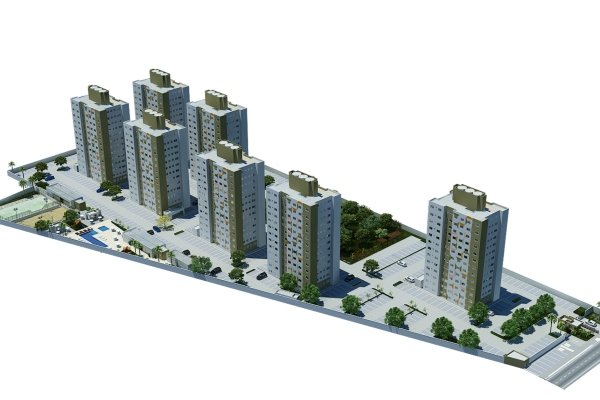
From that moment I decided along with my brothers that we had to find a way to change the company, and so we started to look at social responsibility 25 years ago. This concept of social responsibility is what I think gives our company the credibility it has. I believed that it was impossible for us to request a well-executed job from a citizen without offering them dignity in return. When I said that we deliver more than just a top quality apartment, what does quality mean to me? Well it’s much more than it may sound. For me it means 5 things; firstly that I qualify and train my workers and I give them dignity. I like my workers to feel proud of working in our company. I want them to be happy to pass in front of the building where they work and say I work here. I need to be able to provide the right working conditions so that they can be proud to tell their parents that they work in my company. How can they possibly do this if they don’t have somewhere to eat and drink, if they are eating out of their hard-hats for example? That is awful. So let me tell you what I do for my workers: we offer reading and writing classes, we have refectories with televisions, tennis tables, etc. We also offer a series of programs that teach the wives of our workers some other skills to help them increase their family income. For example when the workers are busy and the refectory is free, the wives can come on site to study a manicure or hair dressing course. So I am letting these family members come on site, to see where their husbands or relatives are working and to study a new profession at no cost to them, so that they can help to support their family. I want to help these families prosper and feel proud to be part of our company. This has a consequence, if you do this for them, they will be happy and will feel up to doing a great job and at the end of the day, in this company, the turnover of employees is really low because people want to keep their jobs as they are happy here. Furthermore the number of worker complaints that we receive is minimal, and I have to say that of the very few cases that we do receive and go to court we win because we have a culture here that is known within the tribunals, of transparency in our company, so it is very difficult not to work in a serious and responsible way. So by training up these guys they become better workers, I invest in them, etc.
Secondly, I have invested in technology. I use the best equipment. In terms of the work in the firm I have invested in courses here and abroad. Here everyone who works in this company has to do a one year course minimum. On site we are always training and reinforcing previous training. Therefore we are always investing in technology, participating in fairs and keeping up to date with new technologies, etc.
Third is the matter of the environment. We have always been looking to work on projects where the environment is a priority, even before this became law. We have always cared for the environment and this is something that has set us apart. Now that in Brazil there is a new law regarding the environment and everyone is now becoming aware of this, every company is now taking on board the environmental issues. However we were acting in this way a long time ago. We have carried out campaigns regarding the planting of trees, no one is obliged to plant trees but we have planted 5,000 seedlings every year. We have run a campaign to clean the beaches, which was a voluntary campaign for our employees. We have 1,000 workers, but they are not all obliged to clean the beaches, only those workers who want to participate go, sometimes there are 50 volunteers sometimes 100, it depends. The projects we work on are developed with the idea of preserving the large trees that already exist. In the landscaping that we design for our condominiums we always take the environment into account. Need I say more? The matter of the environment is fundamental to us.
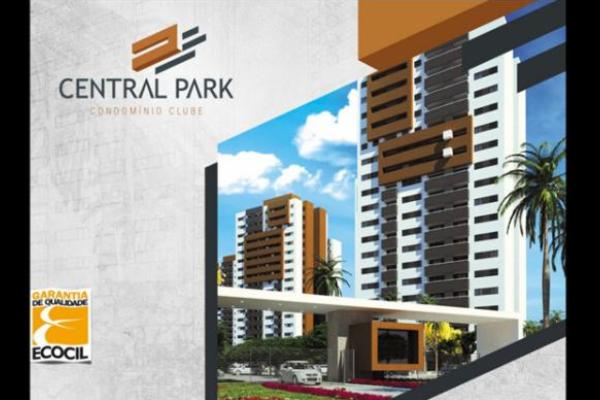
A long time ago we set up 3 or 4 partnerships with the community, what is this? Well, there’s nothing worse than living in front of a construction site with all the dust and noise. Here, we do everything we can so that the neighbourhood suffers the least amount possible during construction. It is difficult, with all the cement, the dust and the dirt. We always try to minimise these problems, and look to resolve the problems that come about. Another aspect of the community partnership is that we also invest in the cultural side of the city, to try offer the city a vision that we have of social values and city culture, which is what we really think the partnership with the community means. We sponsor athletes and we sponsor cultural events, etc. For the 50 year anniversary of the company, we gave a monument to the city called the “Arco do Sol”, which unfortunately is now in the hands of the city hall for maintenance work and has not yet come back. However, this time when we celebrate 60 years we are going to offer another monument. When we celebrated 50 years at first we thought we would celebrate by organising a big party or by releasing a book of our constructions, we thought a party would be over too quickly and a book would be just placed on the shelf, so we thought about what could do to offer something lasting for the city. So we decided to give this beautiful monument, whose design is a wave in the ocean with sun rays and was developed by my brother Felipe Bezerra.
The fifth point that brings credibility to the company, fifth not because it is the least important but because it couldn’t be achieved without all that I have already mentioned, is excellent customer service. I can’t say to a client that I have an amazing company with amazing development projects without all that I have just mentioned. For 25 years we have had this website, so we can offer our clients access to detailed information about their contract, their payment arrangements, the construction work, photographic reports, i.e. all that the client might need to know, we have had for over 20 years recorded online. For example from the moment the clients calls us up, we are able to see their name and photo appear on the computer so that we can attend the client directly by name. We have this important databank ready to attend our clients in the best way possible. I believe that the brand is really what sets us apart from our competition and we look after our brand in these 5 ways. I am very enthusiastic about this.
Now I would like to talk about the projects you have at the moment here in Brazil, I believe you have 22 projects at the moment? Can you tell us a bit about what kind of projects these are?
Exactly, we have various projects on the go, 22 projects in development, but there is one in particular that is very special. This project is our showcase and is very important and dear to us. We are creating a new neighbourhood that is going to be called Bouganville. It is the largest and most central project that we have at the moment. It is going to be an area of 240 hectares in the heart of Natal, in the last available area between the airport and the city. We are going to build a planned neighbourhood; a community for which we are contracting the best professionals available in the world. We have spoken to Norman Foster in England, with personnel at EDSA in Miami to make a master plan, and we are negotiating with Shopping São Paulo, etc. The concept is a planned community that will have a shopping mall, a hospital, commercial buildings and vertical and horizontal condominiums, etc. It is going to be a place that offers everything you might need so that you don’t have to leave the neighbourhood to find anything. People will be able to walk or cycle everywhere; this is going to be a place with a real notion of protecting the environment with sustainable development. It’s going to be a green neighbourhood and a safe neighbourhood which is very important and in certain other places unfortunately is not the case. Our dream is that this project becomes the model for the middle class in Brazil. This is the message that I gave to Norman Foster, to his directives and to other companies that are interested in working with us on this project. We have not yet closed a deal with any company, be it Norman Foster or EDSA. We are looking for the best possible partnership to make the master plan for the sustainable neighbourhood to make this project a model for the future.
So in terms of this project you are looking for partnerships from international companies?
Yes, we are looking for the best international talent. When we look for these companies there is just one challenge: creating an expensive, upper class, commercial project is very easy, you just need the money to do it, however the challenge is to create a sustainable project for the emerging, middle class in a country like Brazil. So these architect firms work to an international standard in many different countries, but Brazil is the next big thing, and Brazil is a developing country. However, these international project developers are not yet here in Brazil working on large projects, they are only involved in smaller projects so far. What am I saying to all these international companies is that here with us they are going to have the opportunity to work on a super project in partnership with our company that is a growing, medium sized company, respected all over Brazil and of course here in Natal. And so if they want to be part of a successful project in terms of financial revenue and a project that is viable both environmentally and socially the opportunity is here. As I said it’s easy to design an expensive project for the rich upper class of society, but to design a project for the middle class here, which is not the same as the middle class in America or Europe, because ours is an emerging middle class, is the big challenge. The international project developers are excited and motivated because they know that few cities have such a large area for development as we have here.
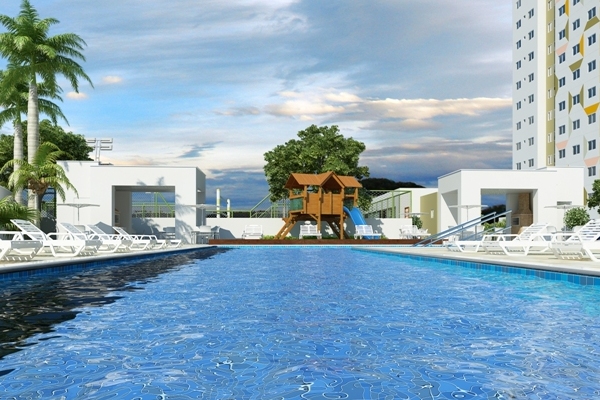
I am really excited and proud of this project; I think it is a fantastic project. This development alone is projected to have a total sales value of 1.5 billion reals. The challenge is to make this a new and original idea that we haven’t yet seen here in Brazil.
Excellent, coming back to the idea of international partnerships, can you tell us what the main areas of opportunities for foreign investment are?
All of our projects are spherical, Ecocil S.A. has low interior capital for these 22 projects, and each project has its own design, proposal and specific partners. The majority of those 22 projects are 100% ours. But eventually we have to join with partners, for example when we buy land we often work in partnerships if the plot of land is very big and we need investors to support the purchase. Therefore we work with various investors, for example the investment fund in São Paulo, shareholders, local investors, land owners, etc. Consequently there are many opportunities for investment so long as we share a common goal. We have partners that we often work with and so when a good opportunity comes up we know where to look for investment. With our excellent track record these investors don’t hesitate in investing and many reinvest in our company. The investors that reinvest in our company are the ones we really value working with.
The other opportunity or the other way of investing in our company is investing in the corporation. We created two private equity funds (FIP), the FIP I in 2008 and the FIP II in 2012 for which the share values were different to the FIP I. The FIP I is being renewed for new investors.
We also have plans to expand our company; these plans are clearly defined by our advisory board. This is going to happen via three possible means. By the end of the year we are going to publicise which means we have chosen, as they are all being studied at the moment. Either we could grow and expand organically as everyone does, but this has the considerable disadvantage that it is a very slow process. It entails going to the neighbouring states Pernambuco, Ceará, and Paraíba for example, buying land and establishing the image of our brand in these states. We have already done some projects in these states but our brand is not known well enough yet. This is one alternative but it isn’t the preferred one. The 2nd option is that we could go to these neighbouring states and repeat the formula we have used here, which is where the opportunity arises for investors who want to invest with us. This would offer excellent opportunities for investors looking to invest here in Brazil.
We would offer the same secure investment as with our FIP and similar criteria as for the investment made by the English investment fund. We would look at the possibilities available in Paraíba and Ceará, and we would repeat the formula that we have used here in Rio Grande do Norte.
We would analyse the market and find a partner and grow. The third option would be to create a fusion with companies that have a similar profile to ours. We would have to identify which company is suitable in each state and then make a new regional company, to be a strong joint venture in the region. Then, in the future or in the medium term we could potentially expand even more either on our own or by means of a part acquisition by a large company or a foreign company.
The reality is that the largest companies from the south are not going to stop coming to the North East of Brazil. One thing is clear, the property market here is very local, and regionalisation was not respected by the companies that came here. The local culture makes a difference; at least here in the north east that’s the case. We saw many examples of huge companies, coming here and not respecting the local community. Therefore I think that the strategy of an investor acquiring part of the shares but with the management remaining local could be the best option or perhaps the fusion of a similar company with ours. Either way in both cases there are opportunities for those who want to invest with us. We are designing these possibilities together with various investment banks in São Paulo and other national banks. All are in support of the strategy, as it is something different for this region. The name we have assigned for this strategy is ‘The Northeast Developers’.
Where do you see Ecocil in the next 2 or 3 years and how would you like the company to transform over the next 10 years?
My dream in terms of the market is always the same: to have clients that are as passionate about my company as football fans are passionate about their teams. This is the answer to your question about my dream. I want my clients to be as passionate as the fans of Real Madrid, Barcelona, Flamingo, etc. The thing with football fans is that they can change girlfriend or they can move city but they will never change teams. This is what I want to achieve in my business over the next 3 to 5 years here in the north east of Brazil. My aim is to stand out as one of the best companies in the north east, individually or as a partnership. I don’t see any barrier against setting up joint ventures.
What is your message for the international readers who are thinking about investing in Brazil, why should they come to Rio Grande do Norte over other states in Brazil?
That is very easy to answer because our state is full of potential and opportunities. We have natural resources that are not even being exploited yet, there are various opportunities with petrol, salt, fruit, minerals, etc. In this sense we are a very rich state. However our state is still poor in terms of infrastructure. There is a great area of opportunities for foreign investors to come and invest in infrastructure. We don’t have good hospitals and there aren’t any public schools that are privately managed. We still don’t have any private highways. The first private airport is now being built here; it’s going to be huge and will have capacity for 6 million passengers. This is going to generate a huge amount of business, and is the second reason why I think investors should come to Rio Grande do Norte. We don’t yet have a large port here so there is the opportunity for investors to come and invest in building a new port which would be really welcome here.
Natal is going to be one of the host cities for the World Cup, which is going to provide us with an opportunity like no other to show off our city to the whole world. The fact that we are going to be a host city was a great factor in the decision to build such a huge airport here. Both the new airport and the World Cup are going to bring in huge amounts of tourism. Not only were we chosen for the World Cup but the most influential TV channel in the country is currently broadcasting a series that was filmed here, showing the whole country our natural beauty. I think if our state were to have a one minute long commercial during one month on this channel it would use up the entire state budget and yet we have this program to show off our potential. So we have been blessed with this great opportunity to exhibit our state at an opportune moment, when we are investing in the preparations for the World Cup and we are building our new airport. So for these reasons and many others, I think now is the perfect moment for any investor thinking of investing in Brazil to come to Rio Grande do Norte. Not to mention the fact that we have something that really sets us apart and that is the hospitality of the people here in Natal and Rio Grande do Norte. We have been known for our hospitality ever since the Second World War, when many Americans came and established themselves here. We were known as the ‘Trampoline to Victory’. At that time we were practically invaded by Americans and we didn’t have any hotel infrastructure or barely any restaurants, so all the local people learnt to give great customer service and this culture has been passed on since the 1940s. I definitely consider that in all of Brazil, the people from Rio Grande do Norte could well be the most welcoming and friendly, we really welcome visitors with open arms. We welcome those who are serious about investing here.